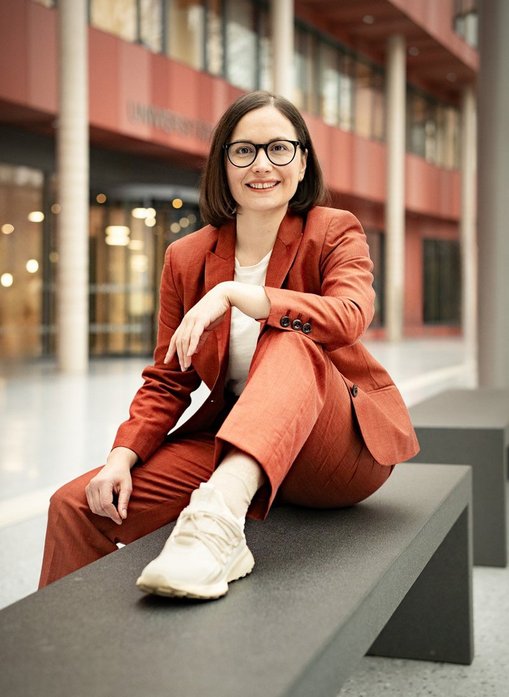LATEST NEWS
Short interview with Prof. Dr. Marion Koelle
Prof. Dr. Marion Koelle was appointed professor of media computer science with a focus on human-computer interaction at the Faculty of Design Computer Science Media of Hochschule RheinMain (HSRM) on February 01, 2025. After studying media computer science at the Ludwig Maximilian University of Munich, Marion Koelle went on to complete her doctorate at the Carl von Ossietzky University of Oldenburg in 2019. During her doctorate, she developed prototypes of data glasses that respect the privacy of users and the people around them. The thesis was awarded the dissertation prize of the university association Universitätsgesellschaft Oldenburg e.V. Marion Koelle then worked as a postdoctoral researcher at Saarland University where she conducted research on body-based and bio-digital interfaces. Her work in this area has been honored and exhibited several times. In 2022 she became head of the Personal Pervasive Computing group at OFFIS - Institute for Information Technology in Oldenburg. She was awarded the Helene Lange Prize 2020 for her scientific contributions in the field of digitalization and socially responsible technology development and received the Digital Female Leader Award 2024 for Digital Transformation.
What aspect of your research fascinates you the most?
I am fascinated by the versatility and interdisciplinarity of my research in human-computer interaction. I conduct research at the interface between technology, design and people, which results in wonderful links to other disciplines. For me, a great opportunity to think outside the box. In the past, I have worked with lawyers on technical and regulatory frameworks for using smart glasses in public spaces, designed a health app with doctors and developed a questionnaire with psychologists. I particularly enjoyed cooperating with artists and designers in the areas of personal fabrication, e-textiles and bio-digital design. I always want to find innovative technical solutions that focus on user needs. Tomorrow’s technology should not only be aesthetic, user-friendly and functional, but also inclusive, sustainable and socially responsible.
What does “good teaching” mean to you?
Good teaching not only conveys technical and methodological knowledge to students, but also provides them with the self-efficacy to tackle innovative research and design problems. Computer science requires solution-oriented and creative thinking to achieve this. It is very important to encourage students to question technologies and consider the impact of their projects on users and non-users, that is, having in mind the "big picture", including ethical, social and societal impacts. Diverse teams with different experiences and backgrounds are particularly successful at this. Thus, good teaching also means giving students the social skills to work in interdisciplinary and diverse teams to be able to incorporate as many different perspectives as possible in technology development.
What did you want to be growing up?
I wanted to become an artist. In ended up studying media computer science. The combination of design, hardware and software opens up a wide range of creative possibilities. I love creating new things with code and digital manufacturing technologies such as 3D printing or laser cutting. We want to set up a maker space at HSRM’s Faculty of Design Computer Science and Media. It is a laboratory where students and other technology enthusiasts can implement creative projects using various tools, machines and technologies. If there had been maker spaces when I was a child, I would certainly have wanted to be a maker.
What do you enjoy doing in your spare time?
In my spare time, I like to be active and be outdoors cycling, hiking, climbing or skiing. I love the mountains. When it is raining, you will find me drawing on the couch, in a museum or experimenting with a new recipe.
